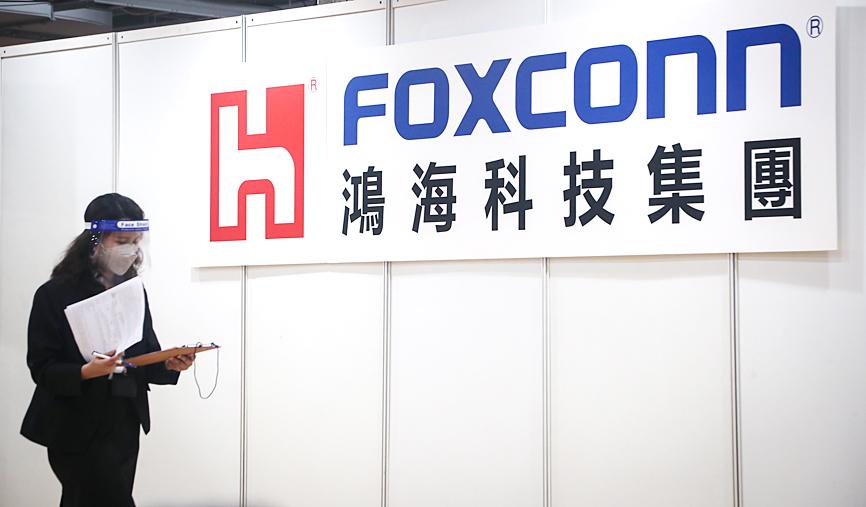Hon Hai Precision Industry Co (鴻海精密) on Thursday reported a record NT$475.099 billion (US$15.86 billion) in consolidated revenue for last month driven by solid demand for cloud and networking devices.
The iPhone assembler, which is known as Foxconn globally, said in a statement that the 13.66 percent year-on-year increase was higher than it had previously estimated, but did not disclose its forecast.
However, consolidated sales in July fell 9.71 percent from June, which Hon Hai attributed to production transition in the smart consumer electronics markets and a subsequent decline in shipments to the month-on-month decline.

Photo: CNA
Hon Hai’s consolidated sales for the first seven months of this year were NT$3.39 trillion, up 8.83 percent from the same period last year.
Sales last month at its cloud and networking division grew by double-digit percentage points from the same period last year, while its electronics component and smart consumer electronics operations also recorded growth, Hon Hai said.
While its consumer electronics and smart product divisions reported a month-on-month drop in sales, demand for the firm’s servers and computing devices remained strong, Hon Hai said.
Strong global demand for servers and computing devices in the first seven months of the year boosted revenue, while its supply chain management efforts also helped, it said.
Strong global demand for smart consumer products in the first seven months benefited its electronics component division, Hon Hai said.
Hon Hai said it remained cautious about demand, as inflation is taking a toll on the global economy and the COVID-19 pandemic is expected to continue to affect the global supply chain.
However, based on current orders, the company is likely to post an increase in sales this quarter compared with the same period last year, when revenue hit a new quarterly high of about NT$1.4 trillion — up 8.8 percent from a year earlier — after Apple Inc launched its iPhone 13.
Market analysts said that as Apple is expected to unveil its next-generation iPhones next month, Hon Hai would ride a wave of strong demand for smartphones this quarter.
Hon Hai is scheduled to hold an investors’ conference on Wednesday to detail its second-quarter results and give guidance for this quarter.
In the second quarter, Hon Hai generated NT$1.51 trillion in consolidated sales, up 11.3 percent from a year earlier and 7.26 percent from a the first quarter.

Taiwan’s technology protection rules prohibits Taiwan Semiconductor Manufacturing Co (TSMC, 台積電) from producing 2-nanometer chips abroad, so the company must keep its most cutting-edge technology at home, Minister of Economic Affairs J.W. Kuo (郭智輝) said yesterday. Kuo made the remarks in response to concerns that TSMC might be forced to produce advanced 2-nanometer chips at its fabs in Arizona ahead of schedule after former US president Donald Trump was re-elected as the next US president on Tuesday. “Since Taiwan has related regulations to protect its own technologies, TSMC cannot produce 2-nanometer chips overseas currently,” Kuo said at a meeting of the legislature’s

TECH WAR CONTINUES: The suspension of TSMC AI chips and GPUs would be a heavy blow to China’s chip designers and would affect its competitive edge Taiwan Semiconductor Manufacturing Co (TSMC, 台積電), the world’s biggest contract chipmaker, is reportedly to halt supply of artificial intelligence (AI) chips and graphics processing units (GPUs) made on 7-nanometer or more advanced process technologies from next week in order to comply with US Department of Commerce rules. TSMC has sent e-mails to its Chinese AI customers, informing them about the suspension starting on Monday, Chinese online news outlet Ijiwei.com (愛集微) reported yesterday. The US Department of Commerce has not formally unveiled further semiconductor measures against China yet. “TSMC does not comment on market rumors. TSMC is a law-abiding company and we are

FLEXIBLE: Taiwan can develop its own ground station equipment, and has highly competitive manufacturers and suppliers with diversified production, the MOEA said The Ministry of Economic Affairs (MOEA) yesterday disputed reports that suppliers to US-based Space Exploration Technologies Corp (SpaceX) had been asked to move production out of Taiwan. Reuters had reported on Tuesday last week that Elon Musk-owned SpaceX had asked their manufacturers to produce outside of Taiwan given geopolitical risks and that at least one Taiwanese supplier had been pushed to relocate production to Vietnam. SpaceX’s requests place a renewed focus on the contentious relationship Musk has had with Taiwan, especially after he said last year that Taiwan is an “integral part” of China, sparking sharp criticism from Taiwanese authorities. The ministry said

US President Joe Biden’s administration is racing to complete CHIPS and Science Act agreements with companies such as Intel Corp and Samsung Electronics Co, aiming to shore up one of its signature initiatives before US president-elect Donald Trump enters the White House. The US Department of Commerce has allocated more than 90 percent of the US$39 billion in grants under the act, a landmark law enacted in 2022 designed to rebuild the domestic chip industry. However, the agency has only announced one binding agreement so far. The next two months would prove critical for more than 20 companies still in the process